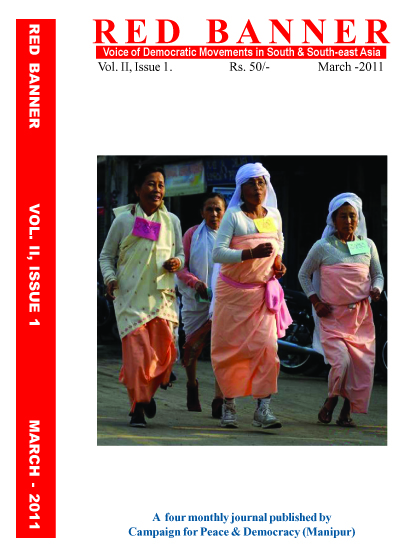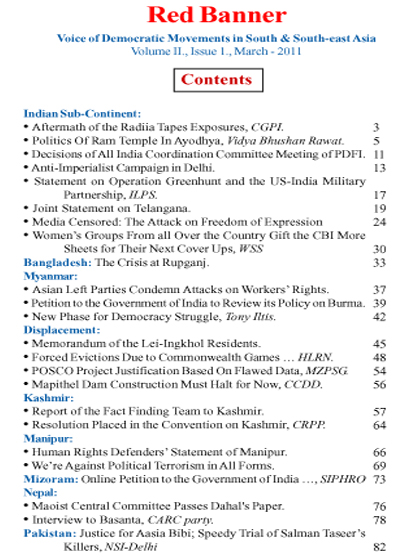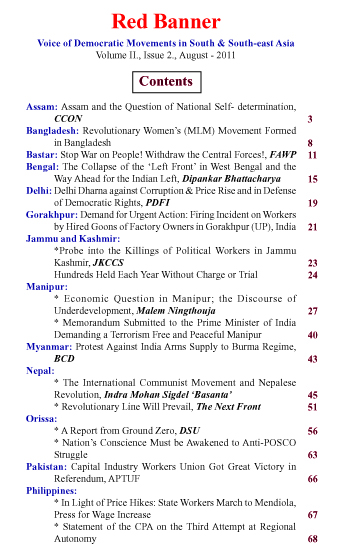Source: Thehalka
This is not the first time Soni Sori has been targeted by the Chhattisgarh police. Hiding in the jungles of Chhattisgarh Sori speaks to Tusha Mittal, about why she is being hunted
 |
| Soni Sori
Photo: Tehelka Photo |
|
 |
|
|
|
|
This is the story of a tribal woman named Soni Sori, 35, a teacher in a government primary school. As you read this, she is hiding in the jungles of Chhattisgarh, dodging bullets, fleeing from police. She is hiding because, perhaps, she knows too much. When Sori spoke to this correspondent in hurried, muffled phrases on the evening of September 11, she had just shifted location. That afternoon, as she hid in mountainous terrain, there was the thud of boots closing in. She ran. They fired. She lived.
This is the story of a tribal man named Lingaram Kodopi, a 25-year-old jeep driver from Chhattisgarh. He had once been wooed by the banned CPI (Maoist), offered a party position. He refused. He has since been threatened by the rebels. He had once been locked up in a toilet in the Dantewada police station for 40 days, brutally beaten, then offered Rs 12,000 a month to become a Special Police Officer (SPO). He refused. He has since been under police radar. In the winter of 2009, Lingaram Kodopi did what many others in Chhattisgarh’s conflict zone have been compelled to: he fled.
In Delhi, Kodopi lived in the basement of an NGO and enrolled in a journalism course in Noida. “I know I will be arrested if I go back home,” Kodopi had earlier told TEHELKA. “But why should I be afraid? I want to do something for my community. Both the Naxals and the police threaten me because they know I don’t fear them.”
He returned to Dantewada in April this year after the 300 homes were razed to rubble in a three-day police operation. At great personal risk, he visited the burnt villages of Morpalli, Tadmetla and Timmapuram, saw first-hand the debri of attacks by the COBRA and Koya Commandoes, met raped women and got precise narrations of police atrocities. By now, a trained video journalist, Kodopi was just beginning to document the stories of his own people.
Kodopi was arrested on September 10. Dantewada SP Ankit Garg confirmed that he has been charged under the draconian Unlawful Activities Prevention Act, the Chhattisgarh Public Security Act, and sections 121, 124A and 120 B of the IPC for criminal conspiracy, sedition, and waging war against the State of India.
On Independence Day this year, both Kodopi and his aunt Soni had defied the Maoist order to raise black flags in Chhattisgarh. When Maoists tried to put up one in Kodopi’s village, he tore it apart in their presence. When rebels directed Sori to remove the Indian flag from her ashram school, she refused. “Too many people have died for this,” she told the rebels. This is why the story of this aunt and nephew is significant. It is the story of another kind of adivasi voice trying to speak crisp and clear from the chaos of a conflict where all parties claim to speak for them.
TEHELKA has learnt that in June this year, a few months before his arrest, Lingaram Kodopi met senior IAS officer and Bastar Division Commissioner K Srinivasulu. “Both the police and the Maoists are killing my people. This has to stop,” Kodopi told the officer. In a significant admission, Srinivasulu has confirmed to TEHELKA that he met Kodopi, a man the Chhattisgarh police have described as a Maoist commander. “Yes, I met him. He came to my office with social activist Swami Agnivesh. I cannot say whether he is a Maoist or not. I don’t think he has any Maoist links,” Srinivasulu told TEHELKA. “I know him is a poor tribal boy from a backward region trying to study in Delhi. He represents this area. He told me he fled because the police doubt him to be a Maoist informer. I said he should return, he belongs here, his presence here is important. I said I would help him in whatever way I can. I have a soft corner for him.”
Srinivasulu said he was not aware of Kodopi’s arrest. “I was traveling. I have just returned. I am hearing about this from you. I have called the Inspector General and Superintendent of Police to find out. It is an allegation of the police. It has to be proved. We will try to sort it out.
It is past sundown in the jungles of Chhattisgarh, and still Soni Sori must not return home. In frantic phone calls, she has been warned of men in plain clothes lurking outside her mud-hut, roaming the village market, patrolling all entry and exit points.
“Soni Sori is absconding,” confirmed Dantewada SP Ankit Garg. “We are looking for her.”
Over a breaking phone signal, her voice fading in and out, this is what Sori told TEHELKA on September 11: “The police are trying to kill me. They fired at me today. I fled. I fell into a hole as I was running. I managed to hide. I’m trying to escape from here. I need to get to Delhi. They know I know too much. I need to stay alive to keep the truth alive. They don’t want me to reach Delhi. I can’t let them kill me.”
There is nothing in Soni’s exasperated voice to suggest helplessness, to suggest that she is a victim. What is more terrifying is her sense of resolve. Last year, the Chhattisgarh police arrested her husband on charges of Maoist activity. Two months ago the Maoists accused her family of aiding the police, looted her house, and shot her father in the leg. “I can’t understand what’s going on,” she continued. “The Maoists looted everything we have. They shot at my father. Now, I’m running from the police. My five-year-old daughter is at home crying. My husband is in jail for being a Maoist. I don’t know what they want. Just wait. Let me come to Delhi. I will expose them. I cannot tell you on the phone what I know. Let me get out of here first. I don’t want to anger the police now.”
According to the Chhattisgarh police both Soni Sori and Lingaram Kodopi are abetting the banned CPI(Maoist). On September 10, police arrested Lingaram Kodopi and a local contractor named BK Lala for attempting to transfer funds to the Maoist party. The arrests were made after a secret US embassy cable released by the Wikileaks website alleged that Essar industrial group was paying huge sums to the Maoists to not interfere with their mining operations in Chhattisgarh. Essar has denied this.
“Lala was acting on behalf of Essar while Kodopi was acting on behalf of the Maoists”, Dantewada SP Ankit Garg told TEHELKA. “We arrested them from a weekly market in Palnar village. They planned to exchange Rs 15 lakh. We got a tip off and caught them red-handed with the money. There was another woman called Soni Sori with them. She escaped due to some confusion. “
Sori denies the allegation. “This is totally false. Seven men in civil dress arrested Lingaram from my house in Palnar village. They tried to drag me as well, but could not. We have nothing to do with Essar,” she told TEHELKA. She also revealed what is a significant twist to the official version. “The police wanted Lingaram and I to pose as Maoists. They asked us to meet the Essar representative as Maoists. They told us to collect Rs 15 lakh from Lala and hand it to them. We refused to do it.”
Asked whether the police plan to question any named Essar officials, Garg said: “BK Lala has confessed during interrogation that he was supplying money on behalf of Essar. But the statement of an accused has no value. It has to be corroborated. We will question Essar officials. If this claim is verified, then we will definitely make arrests and take legal action against Essar as well.”
This is not the first time Sori and Kodopi have been targeted by the Chhattisgarh police. “Both are Maoist associates with a criminal record,” SP Garg told TEHELKA. In July 2010, Chhattisgarh police issued warrants against the Kodopi, Sori and her husband for involvement in a Maoist attack on a Congress worker Avdesh Gautaum and his son. Gautam had escaped unhurt, while his son sustained bullet injuries. Incidentally, Sori’s elder brother Vijay Sori is a Congress block president in Dantewada. “This was not right. The Maoists should not have attacked Gautam’s son,” Soni told TEHELKA in an earlier interview.
Sources say the Maoist attack came after Gautam had convinced then Dantewada collector Reena Kangale to close down all the PDS distribution shops in Dantewada’s Kuakonda block. Alleging that Naxals were benefiting from rice doled out of village PDS shops, Gautam suggested he control all the rice distribution from a central point, his home. If any Maoists came to collect rice, he reasoned, he could then have them arrested. Gautam could not be reached for comment.
“It is Avdesh Gautam who named me in the FIR,” Sori says. “The police asked me ‘Did you not feel remorse attacking his son?’ Then they said they will withdraw the arrest warrant if I give them information about Maoist meetings and threatened to arrest me if I don’t.” Sori told TEHELKA in an earlier interview. The police also threatened her to sign a document which implicated them in the crime.
“The document said Lingaram is not of good character, that he travels to Andhra Pradesh, Gujarat and abroad. It said that both Lingaram and I had attended a Naxal meeting in Andhra Pradesh a week before the attack on Avdesh Gautam,” Soni says.
It is these allegations that surfaced in a Chhattisgarh police press release in July last year. It alleged that Lingaram Kodopi is a senior Maoist Commander who received arms training in Delhi and Gujarat, and who frequently travels to America. It also touted him as a potential successor to CPI(Maoist) central spokesperson Azad who was killed in an encounter last year. Kodopi does not have a passport and claims he was not even present in Dantewada at the time of the Naxal attack on Gautam. He challenged these allegations in a press conference in New Delhi with social activist Swami Agnivesh and lawyer Prashant Bhushan. “There is no difference between the police and the Maoists,” he said.
It remains unclear whether the Chhattisgarh police continue to view Kodopi as a “Maoist commander” and spokesperson, or whether they now view him as a “Maoist associate.” When asked, Garg told TEHELKA: “In this particular case [Essar money transfer], it suggests he was playing the role of a Maoist associate. In the previous case, we are still ascertaining his role. Maoists spokesperson are not a single person, until they are completely identified (sic). As far as the Congress case is concerned, we are still investigating how Kodopi was connected. We are looking at all possible angles.”
It also remains unclear why the Chhattisgarh police have not yet arrested Soni Sori. While Kodopi fled to Delhi in 2009, Soni has remained in her village Palnar. “There are three arrest warrants against her. She has been absconding,” Garg told TEHELKA. This is a dubious claim since Soni says she had been marking attendance at a government school all along. “Yes, Soni is a government teacher. She was attending school,” Garg admitted to TEHELKA. “We tried to nab her several times but we were not able to. She could not be found [in the school]. We have written to the Collector to take appropriate action against her.”
A likely explanation for the police’s inability to arrest Sori is perhaps that she was being used as bait to lure Kodopi back to Chhattisgarh. “The police told me they will release my husband and withdraw my warrant if I call Linga back. But how can I betray my nephew?” Sori said.
Why Kodopi became a police target also remains unclear. It points to the eccentricities of a conflict zone where merely owning a motorcycle or organizing villagers can leave you marked. “My name is Lingaram from Sameli. I am a driver. My family has a car in which I ferry people. We have some land on which we farm. I am not very literate,” Kodopi said during an Independent People’s Tribunal held in Delhi in April 2010.
“I was watching TV at home in September last year. Five motorcycles came, with 10 men holding AK 47s. They asked me questions such as “Where did you get the bike from? How do you go about in style?” My family is fairly comfortably off, but they accused me of being a Naxalite. Then the police tortured me for 40 days. Why can’t we adivasis wear a good watch or drive a car without being picked up by the police?”
Kodopi was released from police custody on the direction of the Bilaspur High Court after his family filed a habeas corpus petition. Before he fled Chhattisgarh, Kodopi had been assisting a government project to built 22 toilets in Dantewada’s Kuakonda block.
“I’ve seen Avatar five times,” he once told then freelance journalist Divya Gupta. “Look at the technology used in that picture and the amount of money spent. In reality there are people dying who nobody wants to save. But I really liked that movie, even if it cost so much. It’s about us.”
Tusha Mittal is a Principal Correspondent with Tehelka.
tusha@tehelka.com














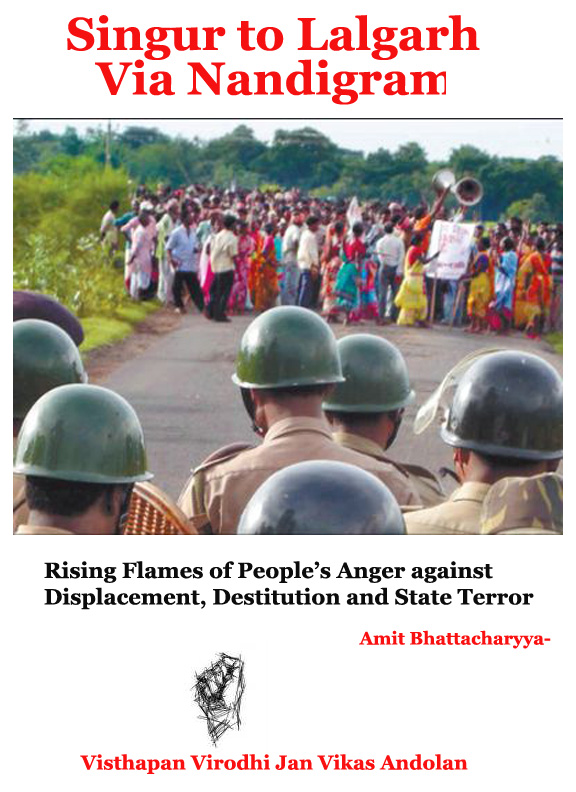










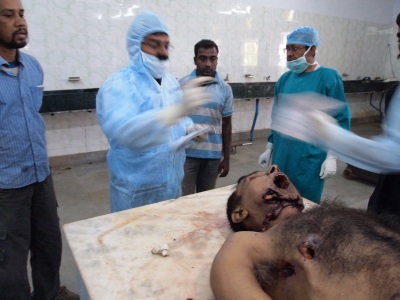
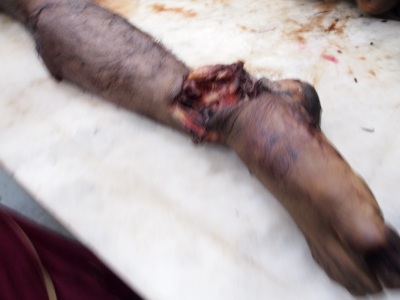
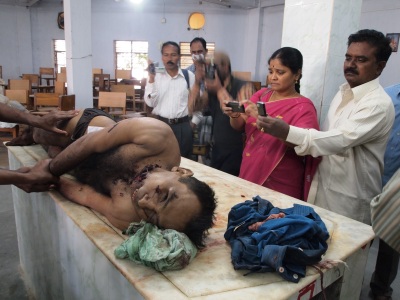
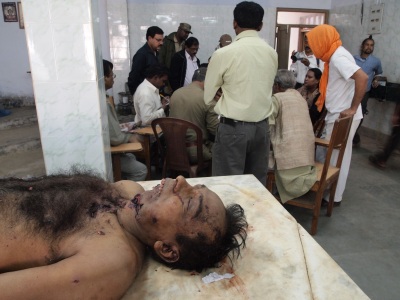
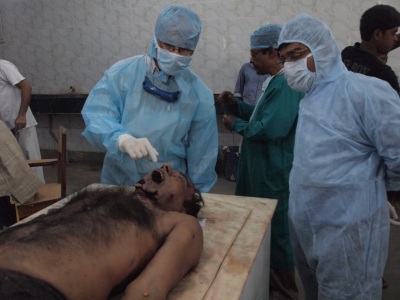
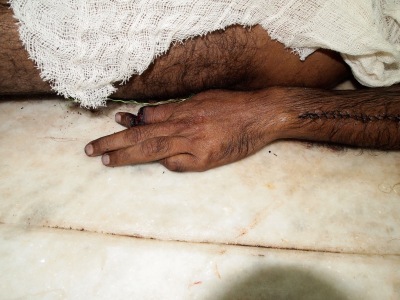
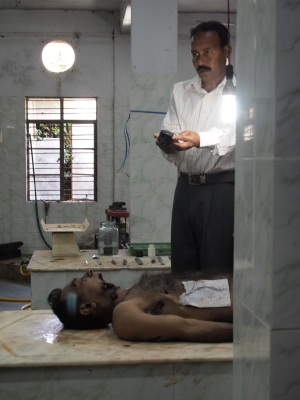




 Members of Nari Mukti Sangh stage a rally in Pirtand, Giridih, on Monday. Picture by Tausheen Rubani
Members of Nari Mukti Sangh stage a rally in Pirtand, Giridih, on Monday. Picture by Tausheen Rubani
